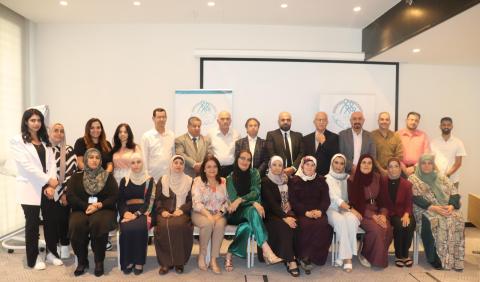

The Higher Population Council, with the support of the United Nations Population Fund, held a training workshop on estimating vital indicators for key data producers in the Jordanian Statistical System. The workshop lasted for two days, on September 25th and 26th, 2023.
The workshop aimed to impart participants with internationally recognized concepts and direct demographic methods for calculating vital signs, as well as enhancing their practical technical skills in estimating signs that measure demographic/vital processes (marriage, fertility, and mortality), In addition, the workshop covered the identification of demographic data and its sources (inventory and flow sources) and devoting for importance of coordination among national institutions that measure these indicators to avoid discrepancies between their estimates.
The workshop was attended by 15 participants representing relevant institutions, including the Ministry of Health, the Chief of Justice Department, the Civil Status and Passports Department, Department of Statistics, the National Council for Family Affairs (NCFA), and the Quality Enhancement for Health Enhancement Project
Dr. Issa Al-Masarweh, The Secretary-General of the Higher Population Council, emphasized that this workshop stems from the role undertaken by the Council as the national reference authority for issues related to population and sustainable development, its interest in administrative statistical data as a beneficiary and a user of this data. The Administrative records provide data about the population dynamics through the registration of various services offered to the citizens, including the registration of vital events (marriages, divorces, births, and deaths).
Himyar Abdulmughni, the representative of the United Nations Population Fund in Jordan, noted during the workshop's opening that civil registration is essential for providing legal identity for individuals and accessing basic government services such as education and healthcare. The absence of this identity can exclude individuals from the official sector and hinder their opportunities to receive such services.
He added that it must be said that the civil registration system in Jordan is advanced, but it still needs improvement regarding the completeness rates, especially in the registration of deaths. Therefore, the United Nations Population Fund has been working on supporting the civil registration system with a view to improving it since 2005, and we are proceeding with the collaboration and coordinating with the Higher Population Council to strengthen this aspect.
Professor Dr. Issa Al-Masarweh, the Secretary-General of the Higher Population Council, and Rania Al-Abbadi, the Assistant Secretary-General of the Council, provided a training presentation during the workshop concerning all aspects of demographic/vital indicators, included the definitions of the purposes and sources of demographic/vital information, the objectives of demographic indicators, sources and forms of demographic/vital information, types and sources of errors in the demographic/vital data, methods for assessing and correcting demographic data, and how to estimate the population size at mid-year.
The workshop focused on training participants of using direct practical methods and techniques to estimate vital indicators, including marriage indicators (marriage rates, divorce rates), aspects and measures of fertility and mortality, methods for measuring population change, and the necessary data for calculating all of these measures and the difficulties of measuring them.
One of the most important outcomes of the workshop agreeing to hold a practical meeting for the workshop participants before mid-2024, to calculate various indicators related to vital events, approve them, and publish them, It also included a set of operational recommendations for the participating agencies to incorporate some important vital indicators in their annual statistical reports and enhance collaborative efforts among the participating entities within the National Statistical System to conduct studies on vital events.







